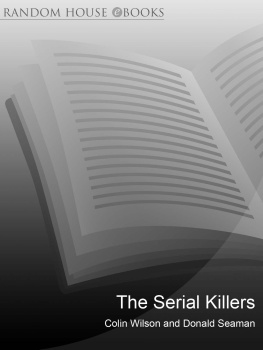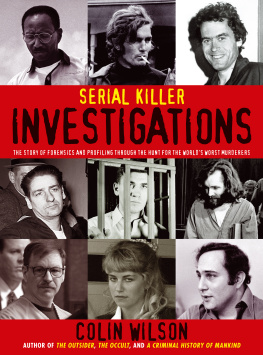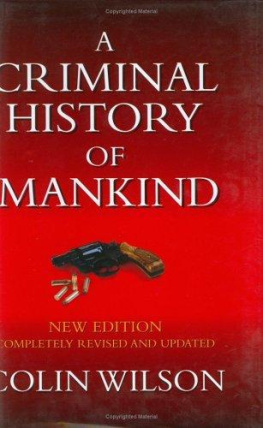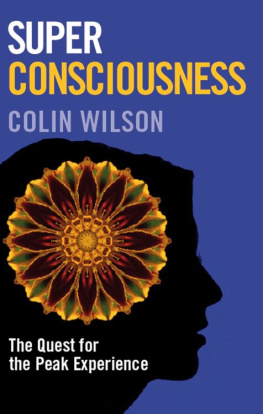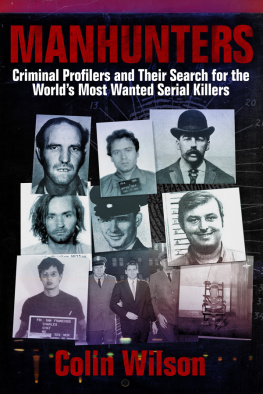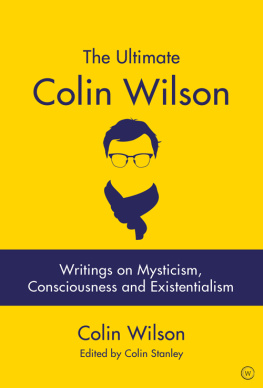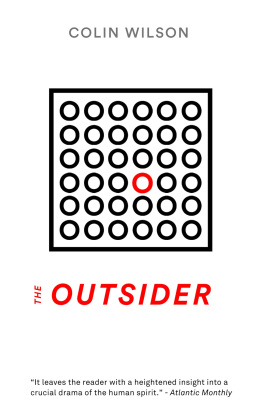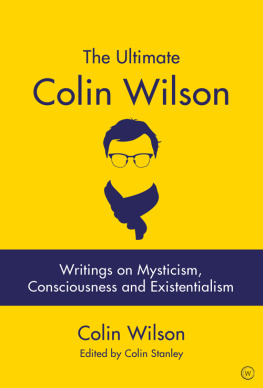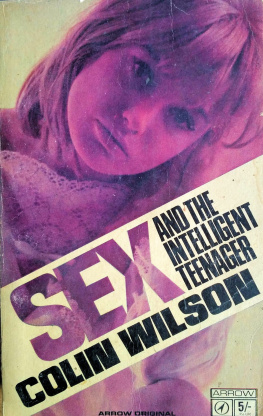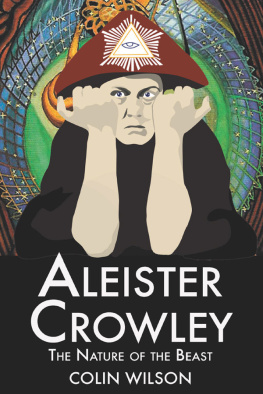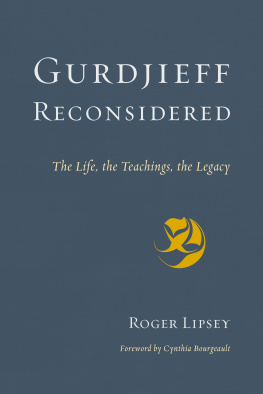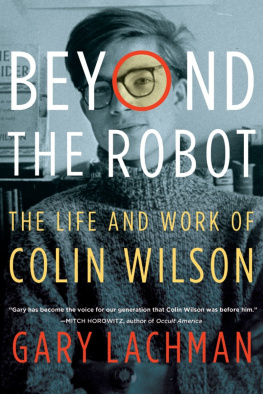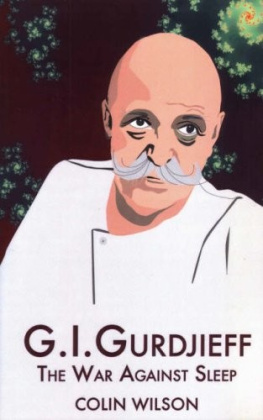By the same author:
ALEISTER CROWLEY: The Nature of the Beast
G.I. GURDJIEFF: The War Against Sleep
C.G. JUNG: Lord of the Underworld
RUDOLF STEINER: The Man and his Vision
The Strange Life of P.D. OUSPENSKY
COLIN WILSON
Aquarian/Thorsons
An Imprint of HarperCollins Publishers
The Aquarian Press
An Imprint of HarperCollins Publishers
77-85 Fulham Palace Road,
Hammersmith, London W6 8JB
Published by The Antiquarian Press 1993
1 3 5 7 9 10 8 6 4 2
Colin Wilson asserts the moral right to
be identified as the author of this work
A catalogue record for this book
is available from the British Library
ISBN 1 85538 079 X
Typeset by Harper Phototypesetters Limited,
Northampton, England
Printed in Great Britain by
Mackays of Chatham, Kent, England
All rights reserved. No part of this publication may be
reproduced, stored in a retrieval system, or transmitted,
in any form or by any means, electronic, mechanical,
photocopying, recording or otherwise, without the prior
permission of the publishers.
Contents
Foreword
Acknowledgements
One The Dreamer
Two The Romantic Realist
Three The Master
Four Creating 'Man Number Four'
Five Success
Six There is no System'
Seven What Went Wrong?
Index
Foreword
A few hours before setting out for America in 1987, I casually picked up A New Model of the Universe , which happened to be lying by the bed because I had been duplicating the chapter on Time for a friend. I began to read 'Experimental Mysticism', and realized suddenly that this was the single most important chapter in all Ouspensky's work, and that what he was saying fitted closely with my own conclusions on the 'relationality' of consciousness, as outlined in the final chapter of my Beyond the Occult , which I had just finished. Oddly enough, I had read 'Experimental Mysticism' before - the chapter was heavily marked in pencil - yet, until that day, had never grasped its full significance. I duplicated it, took it with me to America, and used it as the basis of a number of lectures from New York to Los Angeles. On my return home I hastened to add sections on Ouspensky and 'Experimental Mysticism' to Beyond the Occult .
All this led me back to Tertium Organum , and to the recognition that even if he had never met Gurdjieff, Ouspensky would have been one of the most interesting thinkers of the twentieth century. This had, in fact, been the thesis of a book called Ouspensky: The Unsung Genius by J.H. Reyner. I had felt, at the time, that Reyner was pitching Ouspensky's claims too high; now I found myself feeling that, if anything, he had pitched them too low. Hence my own attempt in this book to stake Ouspensky's claim as an individual thinker and man of genius.
Acknowledgements
I WISH to thank Messrs Routledge and Kegan Paul for their permission to quote from the works of Ouspensky. Dr James Rentoul has drawn my attention to some interesting aspects of Ouspensky's work, as has Chlo Daly, of Laguna Beach, California.
I have dedicated this book to Richard Foreman - another student of the Work - in acknowledgement of the stimulus I received from his immense library while staying in his flat in New York.
CW, January 1992
One
The Dreamer
In the last years of his life, Ouspensky struck acquaintances as a sad and disappointed man; he drank too much, and spent a great deal of time brooding nostalgically about the good old days in Tsarist Russia. It was not entirely Slavic melancholy. He told J.G. Bennett in a letter that nothing could be found by intellectual processes, and that 'there is only one hope: that we should find the way to work with the higher emotional centre'. To this he added the sad comment: 'And we do not know how this is to be done.'
The disappointment may also have been due to a sense of creative unfulfilment. At the age of 20, he had made his reputation with a book called The Fourth Dimension . By the time he reached his mid-thirties - in 1913 - Ouspensky was one of the most promising young intellectuals in Russia, a fine novelist and writer of short stories, and the author of a brilliant and profound volume of philosophy called Tertium Organum . In fact when it was published in America after the First World War, it made him famous. His third book, A New Model Of The Universe , was even finer, and guarantees him a place as one of the most important thinkers of the twentieth century. Ouspensky should have gone on to have become as well-known in the West as contemporaries like Berdyaev, Merejkovsky and Bunin. Instead, he descended into a self-chosen obscurity, preferring to regard himself as a teacher of 'the Work', the 'System' of his great contemporary George Ivanovich Gurdjieff. The latter achieved a considerable degree of celebrity in America during the 1930s. And Ouspensky, as far as he was known at all, was regarded simply as Gurdjieff's chief disciple - although, in fact, they had gone their separate ways soon after the First World War, and Ouspensky even forbade his pupils to mention Gurdjieff's name. Ouspensky must have known that he was one of the most remarkable minds of the century - that he was no more a 'disciple' of Gurdjieff than, say, Coleridge was a disciple of Wordsworth, or Pushkin of Byron. No doubt he would have dismissed the whole question as an absurdity - fame, after all, is little more than a delusion - yet there is something in all of us that wishes to leave behind a name for posterity. And Ouspensky virtually renounced his own name and fame to become an anonymous teacher. Even those who revered him regarded him as a mouthpiece of Gurdjieff's ideas.
When he returned to England from New York in 1947, his former pupil Kenneth Walker was shocked by the change in him: '... he appeared to me to be a man who had lost all of his former enthusiasm and drive.' What was even more shocking was that Ouspensky had apparently lost faith in the System to which he had devoted his whole life. 'There is no System,' he replied in answer to a question. And so the sick man dragged himself on without faith for another nine months. His disciple Rodney Collin wrote: 'In Ouspensky's last months one saw how he accepted being old, sick, ugly, helpless, in pain, misunderstood...' And when, after a final talk to a small group of disciples, he died at dawn on 2 October, 1947, at the age of 69, Rodney Collin locked himself in Ouspensky's room for a week without food.
What had gone wrong? In fact, had anything gone wrong, or had Ouspensky brought his life's work to a kind of genuine fulfilment? To answer that question, we must go back to the beginning...
Pyotr Demianovich Ouspensky was born in Moscow on 5 March, 1878, the son of an officer in the Survey Service and a talented artist. Since in Russia one was either a peasant or a gentleman, Ouspensky was emphatically a gentleman. As his maternal grandparents were also members of the 'intelligentsia,' he grew up among writers, artists and thinkers.
In a more stable society, he would undoubtedly have gone on to become one of the most important philosophers of his time andended as a 'grand old man' whose name would have ranked with contemporaries like Bertrand Russell, Bernard Shaw and Thomas Mann.
Unfortunately, Holy Russia was one of the most unstable societies in the world. At the time of Ouspensky's birth, liberals were clamouring for a constitution. Organizations with titles like 'Land and Liberty' and 'The Will of the People' talked openly about revolution, and were persecuted by the police. Just after Ouspensky's third birthday, Tsar Alexander II was blown up by a bomb made of nitro-glycerine enclosed in glass. His successor, Alexander III, made a bizarre and heroic attempt to prevent Russia from advancing into the twentieth century by inaugurating a regime of repression, but died of exhaustion after a mere 13 years' rule. His successor, Nicholas II, 'the last of the Tsars', did his best to give the liberals the constitution they wanted, but it was too late: Russia was already living in the shadow of the immense tragedy that would engulf Europe and wipe out the Tsar's own family. In 1918, the year the Tsar and Tsarina were murdered at Ekaterinburg, Ouspensky set out on the journey that would take him into exile. The years of security were over and, at the age of 39, he had to start all over again.
Next page

